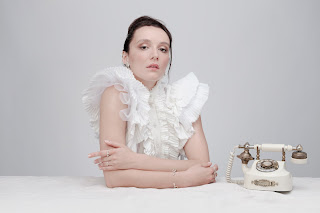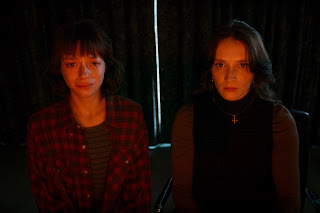Canadian filmmaker Pascal Plante made quite a splash on the festival circuit with his two previous narrative features, Fake Tattoos and Nadia, Butterfly, which competed at Berlin and Cannes, respectively. In keeping with this trend, Plante's latest film, the compelling, unsettling Red Rooms (French: Les chambres rouges) has been selected for the BFI London Film Festival, where it screens out of competition as part of the Cult strand on Sunday, October 8 and Monday, October 9. Red Rooms' appearance at the LFF comes just a few months on from its world premiere at the Karlovy Vary International Film Festival, where it vied for the festival's Crystal Globe; while it ultimately fell short in its bid to secure the KVIFF's main award (which went to Blaga's Lessons), the film's presence at both Karlovy Vary and London cements its director's position as a European festival mainstay.
The LFF's Cult section, while always worth a perusal, is particularly strong this year, with Red Rooms taking its place alongside the likes of Bertrand Bonello's keenly anticipated The Beast, Frankenstein riff Birth/Rebirth, and belated sequel Nightwatch: Demons Are Forever. With its firm emphasis on the aftermath of violence, the highly implicit Red Rooms has a connection to another Francophone title from this year's LFF: The Spectre of Boko Haram. While, on the face of it, Plante's film has little for gorehounds to sink their teeth into, its non-transgressive appearance should fool no one: the black-hearted Red Rooms is strong meat, and a difficult film to shake off. It is anchored by a terrifically unnerving performance from Juliette Gariépy, who stars as Kelly-Anne, a successful model who spends virtually all her spare time following every detail of the trial of Ludovic Chevalier (a wordless turn from Maxwell McCabe-Lokos), who is charged with the brutal murders of three young girls.
The trial of Chevalier proves to be something of a media circus, and Kelly-Anne regularly camps out in the cold in order to secure a spot in the public gallery. It is while waiting for entry into the courthouse that Kelly-Anne meets Clémentine (Laurie Babin), a virtually penniless young woman who is convinced of Chevalier's innocence. The rather taciturn Kelly-Anne tentatively strikes up a friendship with the chatty, slightly jittery Clémentine, who eventually takes up Kelly-Anne's offer of a place to stay for the remainder of the trial. We hear graphic descriptions of the murders, all of which are revealed—in one of the film's queasiest developments— to have been broadcast live to one of the darkest corners of the internet, to which the highly tech-savvy Kelly-Anne has access. Footage of two of the killings is used as evidence in the trial, yet the the third murder video has eluded everyone; while attempting to locate the missing recording, the dogged Kelly-Anne—who has accrued a sizeable pot of cryptocurrency through online poker—puts herself in real danger.
But what exactly is Kelly-Anne's interest in this particularly grim case? As Red Rooms begins, this wealthy model could easily pass for a relative of one of the victims, but she soon emerges as a more militant take on Clémentine's murder groupie. Kelly-Anne's full-bore devotion to the cause—which culminates in a nightmarish, jaw-dropping scene that sees her dragged from the courtroom—leads to a rift with her justifiably alarmed agent, while the previously bellicose Clémentine refuses to cross a line that her host has long since breezed past in the quest to discover the truth about these crimes. Yet it is not the fate of Chevalier but rather the mystery of what makes the inscrutable Kelly-Anne tick that gives this deliberately paced film its dramatic heft, and Pascal Plante keeps us guessing until just before the final credits roll. Red Rooms' suggested atrocities instil a rising tide of anxiety that makes for a nerve-shredding couple of hours; this claustrophobic horror is a masterclass of less is more filmmaking, and is quite unlike anything in recent film history.





